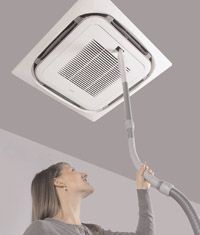Such has been the pace of innovation in air con, it must be difficult for consultants and contractors to stay up with the latest systems' capabilities. But the search for a low carbon solution is not just about choosing the right air conditioning product. John Durbin, Daikin UK's engineering department manager, explains.

The Roundflow cassette reduces maintenance and cost
Almost every new system in the air conditioning market claims to be low carbon. But any new system taken in isolation cannot possibly be sufficient to produce a genuinely low carbon building. What is required is an entirely new perspective of the whole building. Instead of looking at cooling one area or heating another, we need to look at the potential to recover exhaust heat and use it elsewhere in the building.
For example, office IT equipment, refrigeration units and heat pumps in cooling mode all generate waste heat that can be reused elsewhere in the building in many ways - to provide hot water in wash rooms, divert warm air to door air curtains, or heat other areas. By doing so, heat can be generated at a much lower cost, drastically reducing carbon emissions. The possibilities really are enormous.
For example, the Daikin's VRV III Heat Recovery system uses heat pump technology to maximise heat recovery by using multiple zones on one circuit.
Providing year-round heating and cooling for small- to large-sized offices, hotels or other commercial facilities, it offers a whole building system that can cool, heat and ventilate different areas, as well as providing hot water for sinks and radiators. It's like a perfect circle of renewable energy.
Such systems are remarkably efficient too. Micro processors balance the system's cooling and heating loads to enable its compressors to operate at power levels 40 per cent to 45 per cent lower than more conventional systems, thus minimising electrical consumption. By taking this approach, less energy is used and much less heat is wasted from a building's envelope - bringing the goal of zero carbon building a step nearer to reality.
Major area of heat loss
Heat recovery also works very well in ventilation systems, which are typically a major area of heat loss. Heat reclaim ventilation recovers heat from waste air extracted from a room and transfers it to the fresh air which is then injected into the room. The recovery of energy from the exhaust air therefore reduces the cooling/heating load on the air conditioning system. Cooling is also free when the outdoor temperature is below indoor temperature, for example at night time.
As a result, it's a compact and energy-saving ventilation solution for commercial environments, both large and small, and can be integrated as part of a total heat recovery solution. But it's not just system design that affects its energy efficiency and carbon impact. Maintaining systems in optimum conditions has a huge influence too.
To make this task easier, Daikin UK has launched a roundflow cassette - suitable for use with VRV, Sky Air and CMS systems - with an innovative self-cleaning filter that maintains optimum airflow, ultimately reducing energy consumption by 10 per cent on average. Daily auto-cleaning prevents dust build up in the filter, which can decrease airflow by 65 per cent and ensures consistent air flow and temperature. The new self-cleaning Roundflow cassette also reduces maintenance time and cost for customers, because the dust is collected in the indoor unit and needs to be removed only every 6-12 months with a normal vacuum cleaner, avoiding the need to re-arrange an office or shop floor for manual cleaning or specialist access equipment.
As a further insurance against reduced system efficiency over time, remote monitoring can provide a malfunction prediction service by constantly monitoring data from the equipment in order to analyse any abnormal trends in performance and recognise any potential problems - often before the malfunction even occurs. It can also identify operational issues such as blocked or contaminated air filters or heat exchangers, so that performance and efficiency can be improved.
Remote monitoring control can deliver further efficiency savings by continually monitoring systems via a compatible controller and internet connection - data on pressures, temperatures, running currents, frequencies, control signals and running hours, so when a malfunction is predicted, or occurs, engineers can analyse the data in order to identify the source of the problem.
Now a new service innovation known as DNSS EcoSave can result in further energy savings of up to 30 per cent by using remote weather forecast information local to the specific site, combined with the data collected from the Daikin air conditioners, in order to adjust the operating parameters of the air conditioning system remotely, to suit the prevailing weather conditions and occupancy levels.
These latest innovations in air conditioning offer more than products at a competitive price, they offer intelligent solutions that ultimately reduce the life-time cost of the system - by reduce building maintenance costs and extending the system lifetime, all while reducing CO
2 emissions and electricity costs - a win-win situation for consultant and customer alike.
1 March 2010